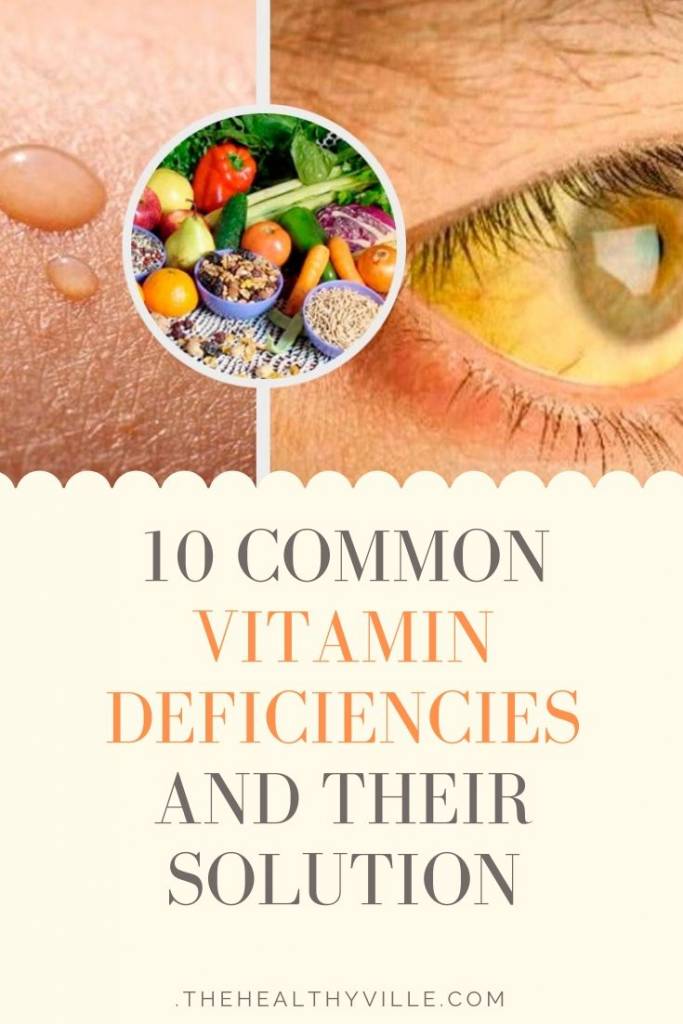There are common vitamin deficiencies that have similar symptoms but also distinctive symptoms that could help you discover them in time.
Do you suffer from acne or bad breath? Many common health problems happen due to common vitamin deficiencies that can be found naturally in certain foods. Vitamins are essential to carry out many physical processes in the body. Therefore, the fact that you have the lack of them will cause health problems.
Next, we offer a list of the consequences of common vitamin deficiencies and their possible solution.
Most common vitamin deficiencies symptoms
-
Acne
Acne is a common condition that is characterized by the presence of seborrhea, pimples and pimples on the skin of the face and body. Its appearance is quite common during adolescence. But if the acne does not disappear or reappears in the years after adolescence, it may be due to a deficiency of vitamins A, B2, B6, C and D.
-
Bad breath
Vitamin B is one of the most common vitamin deficiencies, mainly among vegetarians. This vitamin is vital to have a good digestion. When missing, it can decrease the amount of enzymes that fight bacteria in the mouth and digestive tract. 50 mg of niacin daily can help you with bad breath problems, nutritionists say.
-
Cracked lips
The lips are an external organ of the body that usually does not present serious problems of vitamin deficiencies. The lips, biologically, require more care during the winter. This is because the skin generates certain natural oils that generate the necessary moisture but with cold weather, this moisture is lost. Consuming foods and supplements rich in vitamin E, which acts as a powerful antioxidant, will help you out with cracked lips.
-
Dandruff
Dandruff originates when there are excess dead cells in the scalp. We all have a normal amount of dead cells. But if you notice it in excess, it means that you have a dandruff problem. The main causes of dandruff are seborrheic dermatitis, excess shampoo, psoriasis, fungi, deficiencies of B vitamins, zinc and magnesium.
Further info: Natural Remedies for Dandruff to Get Rid of It Permanently
-
Cuticle
You can probably notice that during the winter months you have an increase in cuticles on your fingers. This is because cold weather dries your skin considerably. This effect increases with certain corrosive chemicals or the constant immersion of the hands in the water. You can solve the vitamin deficiencies that cause this problem by consuming proteins, folic acid and vitamin C.
-
Dry skin
Millions of people are looking for an alternative to maintain a skin that looks smoother and hydrated. We must remember that it can be a characteristic of the person due to genetics. In case you see that this is a problem that has appeared a short time ago, or that you are aware that your diet is not very varied, you may have vitamin deficiencies and consume little water. If it is your situation, try to include foods rich in vitamin A and C that will restructure your dermis.
-
Athlete’s skin
Vitamins D2 and D3 are necessary for the proper care of the skin. Its deficiency can lead to the appearance of various diseases such as athlete’s foot. These two vitamins require calcium for their proper absorption. It is necessary to consume 10 micrograms of vitamin D a day, but most only consume half or less.
-
Jaundice
This condition causes the white areas of the eyes and the skin to turn yellow due to excess bilirubin. Jaundice can present any age and its causes are blood diseases, genetic syndromes, hepatitis, infections and certain medications. Deficiencies of vitamins that occur after jaundice include A, D, E, and K.
In this case, jaundice may appear due to hemolysis (destruction of red blood cells, intravascular or extravascular), hepatitis, or jaundice-scleral-sx. For this reason, their treatment will be the underlying cause, and in all of them there could be a vitamin deficit, but it is not what causes jaundice, but its consequence.
-
Paleness
The pigmentation of the skin is due to the presence of melanin that depends on various genetic factors, the amount of time that we expose ourselves to sunlight … There are also vitamin deficiencies that can negatively affect the color of the skin. Vitamin C helps to produce collagen and the lack of this vitamin generates an extreme pallor, damages in the skin and blood vessels and even the loss of teeth.
It suffices to consume with 80 milligrams of this vitamin a day. The lack of folic acid or vitamin B12 can also cause the skin to lose pigmentation. This vitamin is essential for energy and red blood cells production. In addition, when we do not consume enough vitamin B9 we are at risk of suffering from anemia, another situation that makes us pale. At the day we must consume a total of 400 micrograms.
-
Vision problems
The antioxidant vitamins (A, C, E and beta-carotenes) along with the B complex, are very important for our eye health. Even a minimal deficiency of vitamin A can cause eye fatigue, sensitivity to light, dryness and greater chances of getting eye infections.
When the deficiencies are severe, there may be ulcers, corneal problems and blindness, in the worst case. Vitamin A is essential to improve night vision. Deficiencies of vitamin B complex cause sensitivity to light, paralysis of the muscles of the eye, burning sensation and excessive lacrimation.
Conclusions
In conclusion, you can only obtain vitamins through diet or supplements. The body does not produce them. Therefore, we recommend you take a healty diet and go to the doctor or nutritionist at least once a year. As we have seen, vitamin deficiency can have health consequences.
Don’t forget to SHARE the most common vitamin deficiencies and their symptoms with your friends and family on your social networks!

